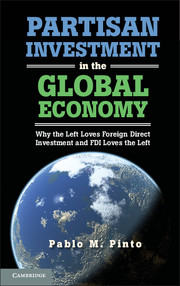 Partisan Investment in the Global Economy
Partisan Investment in the Global Economy Book contents
- Frontmatter
- Contents
- List of Figures
- List of Tables
- Acknowledgments
- 1 Domestic Coalitions and the Political Economy of Foreign Direct Investment
- 2 A Political Economy Model of Foreign Direct Investment
- 3 Tying Hands or Exchanging Hostages: Partisan Governments, Commitment, and FDI Performance
- 4 Partisan Governments and Foreign Direct Investment: Results from Cross-Country Statistical Analyses
- 5 Labor and Business Influence, Investment Regimes, and Foreign Investment in Argentina
- 6 Business Influence, Politics, and Foreign Direct Investment in South Korea
- 7 Conclusion
- Bibliography
- Index
1 - Domestic Coalitions and the Political Economy of Foreign Direct Investment
Published online by Cambridge University Press: 05 March 2013
- Frontmatter
- Contents
- List of Figures
- List of Tables
- Acknowledgments
- 1 Domestic Coalitions and the Political Economy of Foreign Direct Investment
- 2 A Political Economy Model of Foreign Direct Investment
- 3 Tying Hands or Exchanging Hostages: Partisan Governments, Commitment, and FDI Performance
- 4 Partisan Governments and Foreign Direct Investment: Results from Cross-Country Statistical Analyses
- 5 Labor and Business Influence, Investment Regimes, and Foreign Investment in Argentina
- 6 Business Influence, Politics, and Foreign Direct Investment in South Korea
- 7 Conclusion
- Bibliography
- Index
Summary
Globalization of Production and Politics
We live in a world of globalized markets, where goods, services, capital, and workers move across national borders with ease, albeit with different degrees of latitude depending on the type of flow. The transforming effects of this rapid process of global economic integration are subject to heated debates among scholars, pundits, and journalists.
Some argue that technological innovation and changes in the patterns of production at a global level have flattened the world and forced national governments to adjust their regulatory standards to the levels acceptable to multinational businesses and institutional investors (Friedman, 2007; Strange, 1996). Globalization pessimists argue that the forces of market integration have led to a negative form of policy convergence: governments are forced on a race to the bottom and a consequent leveling of national regulatory standards. The territorial state, which dominated the industrial era, is increasingly becoming obsolete, and is gradually being replaced by new forms of global governance (Ohmae, 1995; Strange, 1996, 1998; Rosecrance, 1999). Moreover, the pressure fromglobal markets have blurred the ideological differences among political parties not only in developed countries, but particularly in the developing world: to stay competitive in the global marketplace governments of the left and the right alike have become fanatical advocates of the neoliberal cause (see Edwards, 1995; Williamson, 1990; Garrett, 2000). The conclusion is that when dealing with global market forces, politics does not matter any more, if it ever did.
- Type
- Chapter
- Information
- Partisan Investment in the Global EconomyWhy the Left Loves Foreign Direct Investment and FDI Loves the Left, pp. 1 - 41Publisher: Cambridge University PressPrint publication year: 2013
- 1
- Cited by


